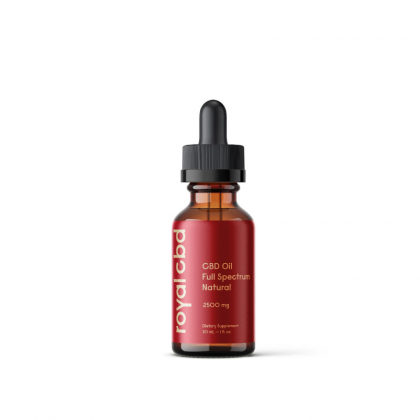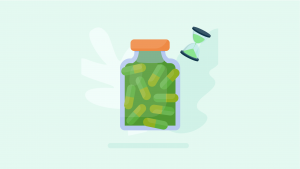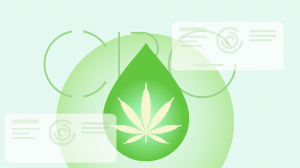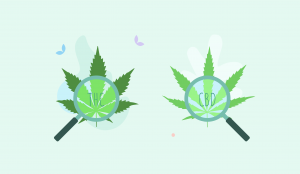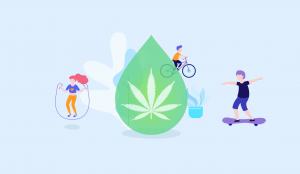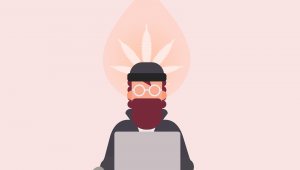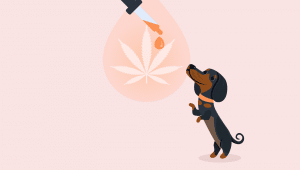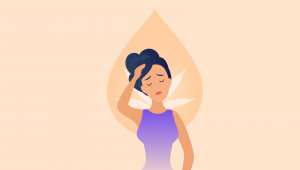| Total CBD: | 500 – 2500 mg |
| Potency: | 16.6 - 83.3 mg/mL |
| Cost per mg CBD: | $0.12 – $0.18 |
| Extract Type: | Full-spectrum |
| THC Content: | <0.3% |
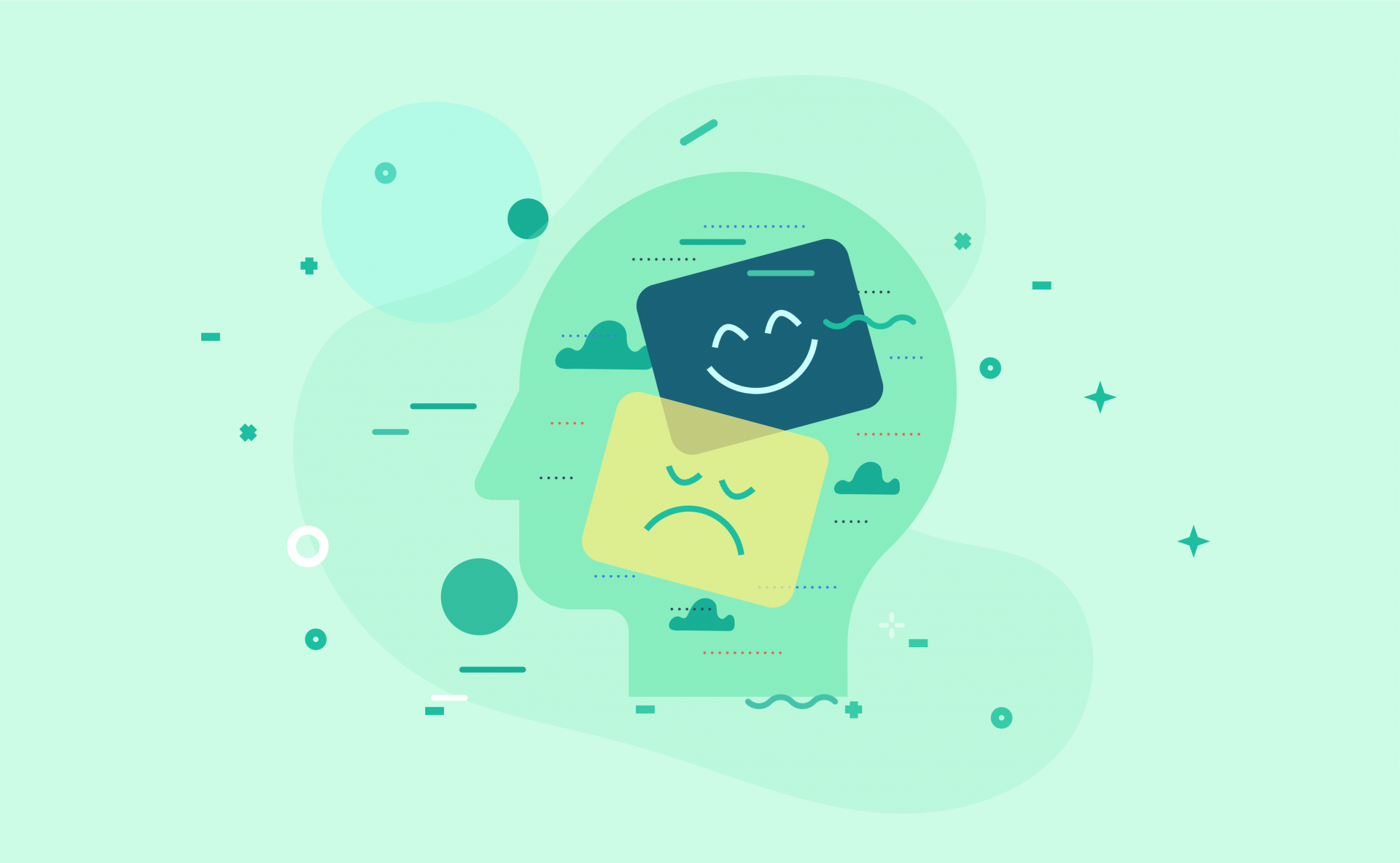
Evidence based
CBD Oil for Bipolar Disorder: Does It Help, Dosage, & How to Use
Bipolar disorder is a condition involving unusual shifts in mood, focus, and energy.
There’s some evidence that CBD can help, but there are a few cautions to be aware of too.
Bipolar disorder affects between 0.4% and 1.6% of the world’s population, according to recent reports. This means roughly 70 million people around the planet suffer from bipolar disorder to some degree.
There are treatment options available — however, they often come with a myriad of negative side-effects, and often don’t work at all.
Cannabidiol (CBD), has been shown to protect the brain from damage and support healthy neurotransmitter function. Through these effects, it’s believed to reduce the severity of the bipolar disorder and help those affected to maintain a more stable mood throughout the day.
Here, we’ll explore the role CBD plays in maintaining mood, how to use CBD for bipolar disorder, and when to avoid it.
Let’s get started.
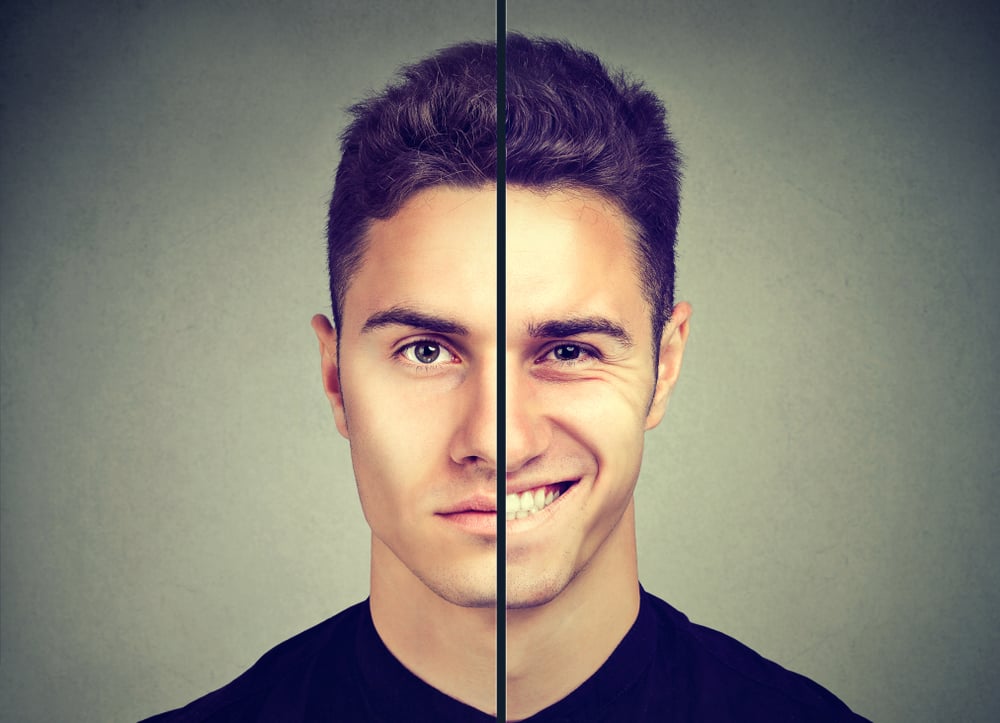
The Benefits of CBD Oil For Bipolar Disorder
Using CBD for bipolar disorder isn’t a new concept, and there’s currently one phase II clinical trial underway comparing the long-term effects of CBD with the effects of a placebo in patients diagnosed with bipolar disorder.
In order to get to this stage of research, CBD needed to pass similar tests with flying colors. If it failed any of the studies prior to this phase II clinical trial, it wouldn’t have been approved for use in the study.
Previous studies found that CBD offers a clear benefit to mood disorders with little to no side-effects.
The benefits of CBD for bipolar disorder include:
- Relieves common side effects such as anxiety or insomnia
- Helps stabilize mood & alleviates depression
- Regulates the endocannabinoid system (involved with the cause of bipolar disorder)
Although there are clear benefits to using CBD with bipolar disorder, there are some important cautions to be aware of before deciding if it’s right for you or not.
Best CBD Products For Bipolar Disorder
Caution #1: The Type of CBD Product You Use Matters
Some cannabinoids in the cannabis plant, including THC, can actually make bipolar disorder significantly worse. Therefore, it’s critical that the CBD product you purchase contains low levels of THC to avoid this.
For bipolar disorder, it’s recommended that only a high-grade, full-spectrum extract with third-party lab testing to confirm the cannabinoid profiles of the product is used.
The other option is to use a CBD isolate — which contains nothing but active CBD.
Caution #2. Other Medications Need to Be Considered
Bipolar disorder is usually treated with powerful antipsychotic drugs. These medications alter neurotransmitters in the brain. Users need to be cautious when taking other supplements, including herbs and nutritional supplements such as CBD oil because it can be difficult to predict how they interact with prescription medications.
Always consult your doctor before trying CBD for bipolar symptoms to check for drug-herb interactions.
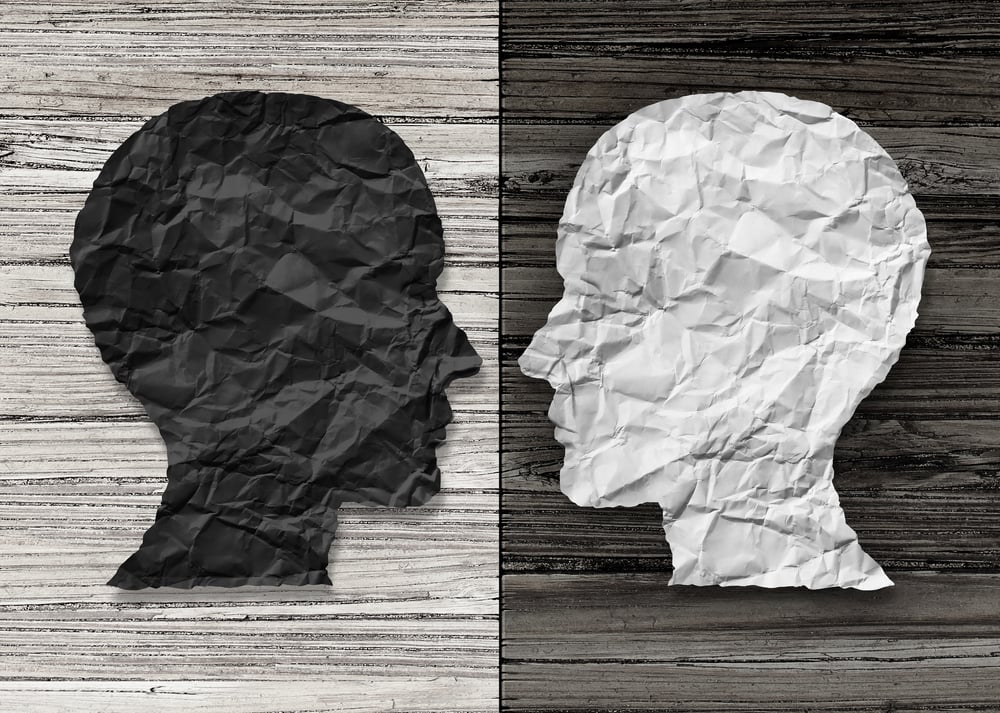
What is Bipolar Disorder?
Bipolar disorder is characterized by dramatic changes in mood, behavior, and energy levels.
The root of the condition is the balance of neurotransmitters in the brain. Neurotransmitters such as serotonin, dopamine, GABA, glutamate, and others all fluctuate and interact throughout the day to regulate our moods.
Everybody’s mood fluctuates to some extent — we have periods of feeling joy and periods of discomfort and irritability. This is normal — however, in bipolar patients, these fluctuations are far more severe, often making it difficult to perform daily activities such as complete work or socially interact.
The specific neurotransmitters responsible for bipolar symptoms can vary, and in many cases, the exact cause is never truly identified.
This makes the condition hard to treat, and much of the treatment in a hospital is done through trial and error — patients try a drug and wait to see if it produces results. If not, they try the next one in line until they find something that relieves their symptoms.
Bipolar disorder causes episodes of extreme emotion that can last anywhere from a few minutes to a few weeks at a time. Episodes can range from mild to extreme.
There are three primary types of episodes experienced by those with bipolar disorder.
1. Manic Episodes
The brain is in a state of hyperactivation, which can make people seem intense or overly happy. During manic episodes, those affected tend to have a lot of energy. They can seem highly motivated and euphoric and tend to develop side-effects such as anxiety and insomnia.
Manic episodes can become dangerous as they can make people reckless and may bring negative side-effects such as paranoia, psychosis, or delusions.
2. Hypomanic Episodes
A hypomanic episode is similar to a manic episode — but tends to be less extreme. It’s often considered a halfway point between mania and depression.
People experiencing hypomania are often able to continue their normal responsibilities, but find it more challenging to avoid distraction or bursts of anxiety.
3. Major Depressive Episodes
Major depressive episodes are the opposite of manic episodes. It causes those affected to have low motivation. They may feel tired and sluggish and can feel severely depressed. They often go through periods of social isolation, and some experience thoughts of suicide or death.
The Causes of Bipolar Disorder
There’s no single cause of bipolar disorder. It’s a combination of many factors ranging from genetic inheritance to environmental and social influences.
Some of the Known Causes of Bipolar Disorder Include:
- Post-traumatic stress
- Hormone imbalances
- Neurotransmitter imbalances
- Neurodegenerative disorders
- Excessive mental stress
- Genetic predisposition
- Chronic depression
Are There Any Treatment Options For Bipolar Disorder?
Treating bipolar disorder is difficult because the cause is hard to determine.
The best treatment for the condition comes in the form of psychiatric therapy to determine potential triggers and underlying causes such as a history of abuse or mental stresses.
Other causes, such as hormone imbalances, should also be tested for and treated as necessary.
In terms of symptomatic support, there are a few pharmaceutical medications effective for treating bipolar disorder.
Medications Used to Control Bipolar Symptoms
- Mood stabilizers (lithium, valproic acid, carbamazepine)
- Antipsychotics (Abilify, Zyprexa, Latuda)
- Antidepressants (Sertraline)
- Antidepressant-antipsychotics (Symbyax)
- Anticonvulsants (Depakote, Tegretol)
Related: Does CBD Interact With Sertraline (Zoloft)?
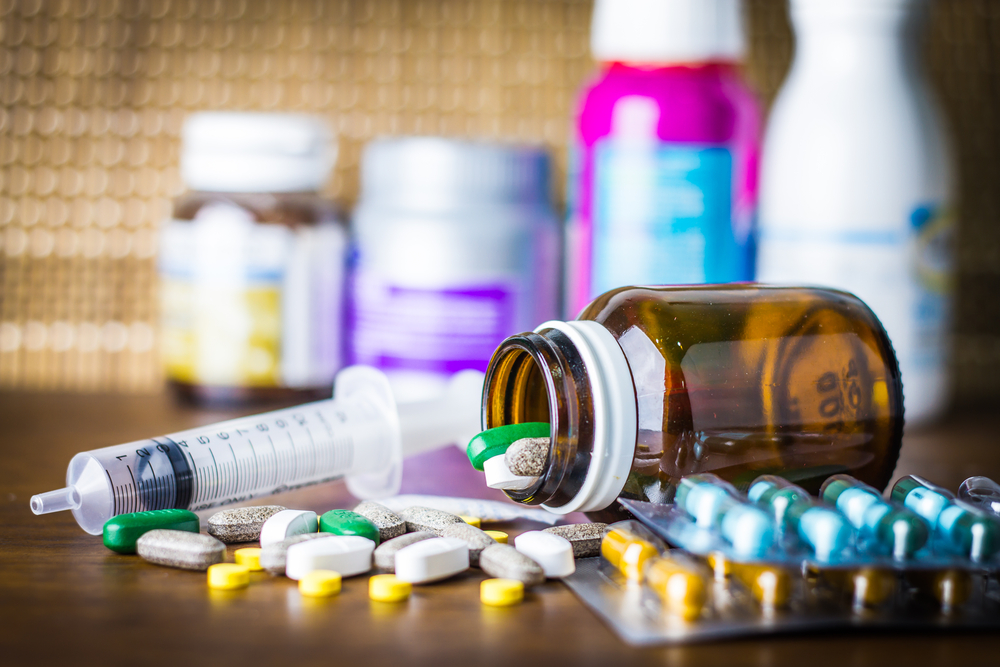
Other Treatments for Bipolar Disorder
- Counseling
- Hospitalization during extreme episodes of mania or depression
- Nutritional support
- CBD supplementation
- Herbal medicine
- Removal of mental stresses
- Sensory deprivation
- Support groups
How to Use CBD for Bipolar Disorder Safely
CBD alleviates many of the common symptoms of bipolar disorder. However, there are also reports of people who had their symptoms magnified due to cannabis use. This is mainly due to the THC content in marijuana, which is neuro-stimulating and can aggravate symptoms.
For this reason, it’s not safe for people with bipolar disorder to consume marijuana that has a high THC content.
To use this supplement safely, it’s important to find CBD oils, capsules, or edibles confirmed to be low in THC and high in therapeutic CBD.
It’s also crucial that you speak with your doctor before taking CBD for bipolar disorder to make sure the compound won’t interact negatively with the medications you’re taking.
Once your doctor has approved you to start taking CBD to alleviate symptoms of bipolar disorder, you need to find the right product to use and determine the best dose of CBD.
There are many different ways you can take CBD. Here, we’ll discuss the most common options in detail and how they can be used alongside a bipolar diagnosis.
1. CBD Oils & Tinctures
CBD oils and tinctures are the most common forms of CBD supplementation because it allows for simple and precise dosing.
They’re made by mixing a CBD extract with oil. CBD oils easier to consume because pure CBD or cannabis resin comes as tiny crystals or a sticky, oily, resin — both of which make it difficult to measure the dose accurately.
As an oil, the dose is measured by counting the number of drops using the provided dropper.
CBD oils and tinctures come in a variety of potencies. It’s recommended that you choose a potency that best matches the dose you aim to take. Use our CBD oil dosage calculator to find your approximate dosage.
2. CBD Capsules
CBD capsules provide another popular method of consuming CBD. They take away a lot of the guesswork when it comes to dosing and make it easy to take your CBD on the go.
CBD capsules also come in both low-potency and high-potency options.
Many people who take a variety of capsules throughout the day with their other medications or supplements find this form the easiest to integrate into their daily routines.
3. CBD Edibles
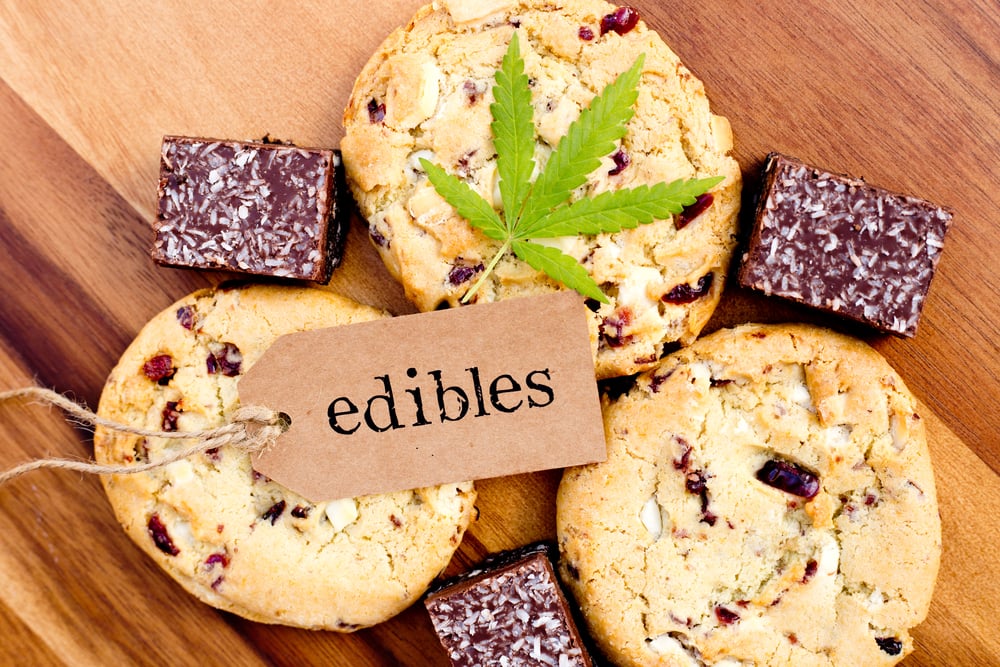
CBD edibles are a great option for people who don’t like the taste of the oils or tinctures and want to avoid swallowing capsules.
They come in all different forms — from CBD-infused honey to CBD chocolates.
The only downside to edibles is that the amount of CBD they contain is often unreliable, making dosing inconsistent.
For a condition such as bipolar disorder, it’s important to be consistent with your CBD use — something that edibles aren’t always able to provide.
4. CBD E-Liquids & Vape Oils
CBD vape pens & vape oils provide the most efficient form of dosing because bioavailability through the lungs is much higher than it is through the digestive tract.
Vaping is a good option for people with bipolar disorder because it offers fast relief from symptoms. It’s also one of the most portable methods of taking CBD.
What’s The Dose of CBD Oil For Bipolar Disorder?
Deciding on the right dose of CBD can take some trial and error. Everybody responds to this compound differently, so a little bit of self-testing is needed to find the right dose. This is also the case with most of the pharmaceutical bipolar medications used.
It’s best to start with a low dosage and build up gradually over time until you find relief from your symptoms.
In most cases, people with bipolar disorder won’t start to experience benefits until they reach the medium- or high-strength doses. Some people even require doses outside the listed range. The only way to find out your optimal dose is to test it.
With that said, you can use our dosage calculator below to find the approximate dose based on your weight and desired strength.
General Dosage Ranges for Psychological Disorders
| Low-Strength CBD | Medium-Strength CBD | High-Strength CBD |
| • Mild depression or anxiety • Periods of higher-than-average stress • Daily maintenance dose for asymptomatic bipolar disorder | • Moderate bipolar symptoms • High stress • Insomnia • Depression | • Severe bipolar symptoms • Anxiety • Severe insomnia |
Most bipolar patients take a medium- or high-strength dose of CBD — however, this can vary from one person to the next.
CBD Oil Dosage Calculator
Potential Side-Effects of CBD
Although CBD is proven to be highly safe in terms of toxicity, it’s important to know about the potential side-effects of CBD. Everybody is different, and what works for one person doesn’t always work the same way for another.
Some of the most common side-effects of CBD:
- Appetite suppression
- Diarrhea
- Drowsiness
- Dry mouth
- Lightheadedness
- Lower heart rate
- Sedation
Final Verdict: Using CBD for Bipolar Disorder
Bipolar disorder can severely interrupt normal daily activities and is difficult to treat effectively.
Many people are now turning to CBD as a means of alleviating their symptoms. It works in a few different ways related to hormones, neurotransmitters, and central nervous system homeostasis (balance). It also helps to alleviate common side-effects such as muscle tension, insomnia, anxiety, and depression.
The most important thing to remember when taking CBD supplements for bipolar disorder is to first consult with your doctor(s) and avoid any supplement or cannabis containing high amounts of THC. This is very important, as THC can make symptoms of bipolar disorder far worse.
We’ve found that most people find the relief they’re looking for with either a medium- or high-strength CBD supplement.
References
- Zhornitsky, S., & Potvin, S. (2012). Cannabidiol in humans—the quest for therapeutic targets. Pharmaceuticals, 5(5), 529-552.
- Ashton, C. H., Moore, P. B., Gallagher, P., & Young, A. H. (2005). Cannabinoids in bipolar affective disorder: a review and discussion of their therapeutic potential. Journal of Psychopharmacology, 19(3), 293-300.
- Mechoulam, R., Peters, M., Murillo‐Rodriguez, E., & Hanuš, L. O. (2007). Cannabidiol–recent advances. Chemistry & biodiversity, 4(8), 1678-1692.
- Zuardi, A. W., Crippa, J. A. D. S., Dursun, S. M., Morais, S. L., Vilela, J. A. A., Sanches, R. F., & Hallak, J. E. C. (2010). Cannabidiol was ineffective for manic episode of bipolar affective disorder. Journal of Psychopharmacology, 24(1), 135-137.
More Health Conditions to Explore
-
Conditions Related to Health Benefits
- CBD For Allergies: Can This Cannabinoid Ease Symptoms?
- Top 10 CBD Oils For Back Pain
- Can CBD Help With Menstrual Cramps?
- CBD for Sciatica: How It Works, Safety, Drug Interactions, & Best Products
- Is CBD a Viable Treatment for Cerebral Palsy?
- CBD Oil For Sleep
- CBD For Psoriasis: Can CBD Help to Alleviate Symptoms?
- Traumatic Brain Injury (TBI)
- Arthritis
- Anxiety & Depression
- Weight Loss
- ADD & ADHD
- Anorexia
- Alzheimer’s Disease & Dementia
- Addiction
- ALS (Amyotrophic Lateral Sclerosis)
- Antibiotic Resistance
- Asthma
- Atherosclerosis
- Autism
- Acne
- Bipolar Disorder
- Pain
- Crohn's Disease & Ulcerative Colitis
- Diabetes
- Epilepsy
- Endocrine Disorders
- Fibromyalgia
- Fatty Liver Disease
- Glaucoma
- Hypertension
- Heart Disease
- Huntington's Disease
- Inflammation
- Irritable Bowel Syndrome (IBS)
- Kidney Disease
- Migraine Headaches
- Muscle Recovery
- Multiple Sclerosis
- Motion Sickness
- Metabolic Syndrome
- Neurodegeneration
- Cancer
- Nausea
- Neuropathic (Nerve) Pain
- Osteoporosis/Bone Health
- Obsessive-Compulsive Disorder (OCD)
- Polycystic Ovarian Syndrome (PCOS)
- PTSD
- Prion/Mad Cow Disease
- Premenstrual Syndrome (PMS)
- Parkinson’s Disease
- Schizophrenia
- Sickle Cell Anemia
- Stroke
-
Conditions Related to Products
- Ranking The Top 13 THC Gummies By Category (Δ8, Δ9, Δ10, HHC, & More)
- Top 10 CBD Oils For Back Pain
- Everything You Need to Know About CBD Sunscreen
- Top 7 CBD Gummies For Sleep & Insomnia
- Top 7 CBD Gummies To Help With Anxiety (2022)
- Best CBD Gummies For Pain (Top-Rated Pain Gummies For 2022)
- Best Hemp Cigarettes (Top 5 Nicotine-Free Smokes)
- Top 5 CBD Lip Balms For 2022
- The Top 7 CBD Face Masks for 2022
- The Best CBD Inhalers For 2022 (& How to Use Them)
- Best Full-Spectrum CBD Vape Juice: What to Look For & How to Use It
- CBD Eye Drops: New Option For Glaucoma?
- CBD Oil For Dogs With Arthritis
- Best CBD Massage Oils In 2022
- Buyer's Guide To The Best CBD Vape Kits In 2022
- CBD Chocolate: Yes, It Exists & It's Just as Divine as it Sounds
- CBD Pre-Rolls & Cigarettes
- Terpene Concentrates
- Best CBD Soaps
- Best CBD Shampoo & Conditioner
- Best CBD Juul Pods
- CBD Isolate Oils
- Full-Spectrum CBD Oils
- Best CBD Lube
- CBD Honey
- CBD Transdermal Patches
- Best Dry Herb Vaporizers
- CBD Oil For Dogs With Epilepsy
- CBD Oil For Dogs With Anxiety
- CBD Oil For Dogs With Cancer
- CBD For Horses
- CBD Chewing Gum
- CBD Pain Cream
- CBD Oil For Cats
- CBD Oil For Dogs
- CBD Hemp Flower
- CBD Suppositories
- Best CBD Gummies for Pain, Sleep & Anxiety Reviewed (2022)
- CBD Teas
- CBD Vape Pens
- CBD Vape Oils
- CBD Coffee
- CBD Drinks & Shots
- CBD Crystals
- CBD Skincare
- Best CBD Oil & Gummies For Kids: Is CBD Safe for Children with Anxiety & ADHD?
- CBD Concentrates
- CBD Bath Bombs
- CBD Capsules
- CBD Sprays
- CBD Dog Treats
-
Conditions Related to Topicals
-
Conditions Related to Oils & Tinctures
-
Conditions Related to Edibles
- Top 7 CBD Gummies To Help With Anxiety (2022)
- Best CBD Gummies For Pain (Top-Rated Pain Gummies For 2022)
- CBD Chocolate: Yes, It Exists & It's Just as Divine as it Sounds
- CBD Honey
- CBD Chewing Gum
- Best CBD Gummies for Pain, Sleep & Anxiety Reviewed (2022)
- CBD Teas
- CBD Coffee
- CBD Drinks & Shots
- CBD Capsules
-
Conditions Related to Gummies
- Ranking The Top 13 THC Gummies By Category (Δ8, Δ9, Δ10, HHC, & More)
- Top 7 CBD Gummies For Sleep & Insomnia
- Top 7 CBD Gummies To Help With Anxiety (2022)
- Best CBD Gummies For Pain (Top-Rated Pain Gummies For 2022)
- Best CBD Gummies for Pain, Sleep & Anxiety Reviewed (2022)
- Best CBD Oil & Gummies For Kids: Is CBD Safe for Children with Anxiety & ADHD?
-
Conditions Related to Hemp Flower
-
-
Conditions Related to Terpenes
-
-
Conditions Related to Cultivation
-
Conditions Related to Concentrates
-
Conditions Related to Delta 8 THC
-
Conditions Related to Delta 9 THC
-
-
-
-
Conditions Related to CBD
- Everything You Need to Know About CBD Sunscreen
- Top 7 CBD Gummies For Sleep & Insomnia
- Top 7 CBD Gummies To Help With Anxiety (2022)
- Best CBD Gummies For Pain (Top-Rated Pain Gummies For 2022)
- Best Hemp Cigarettes (Top 5 Nicotine-Free Smokes)
- Top 5 CBD Lip Balms For 2022
- The Top 7 CBD Face Masks for 2022
- The Best CBD Inhalers For 2022 (& How to Use Them)
- Best Full-Spectrum CBD Vape Juice: What to Look For & How to Use It
- CBD Eye Drops: New Option For Glaucoma?
- CBD Oil For Dogs With Arthritis
- Best CBD Massage Oils In 2022
- Buyer's Guide To The Best CBD Vape Kits In 2022
- CBD Chocolate: Yes, It Exists & It's Just as Divine as it Sounds
- CBD Pre-Rolls & Cigarettes
- Best CBD Soaps
- Best CBD Shampoo & Conditioner
- Best CBD Juul Pods
- CBD Isolate Oils
- Full-Spectrum CBD Oils
- Best CBD Lube
- CBD Honey
- CBD Transdermal Patches
- CBD Oil For Dogs With Epilepsy
- CBD Oil For Dogs With Anxiety
- CBD Oil For Dogs With Cancer
- CBD For Horses
- CBD Chewing Gum
- CBD Pain Cream
- CBD Oil For Cats
- CBD Oil For Dogs
- CBD Hemp Flower
- CBD Suppositories
- Best CBD Gummies for Pain, Sleep & Anxiety Reviewed (2022)
- CBD Teas
- CBD Vape Pens
- CBD Vape Oils
- CBD Coffee
- CBD Drinks & Shots
- CBD Crystals
- CBD Skincare
- Best CBD Oil & Gummies For Kids: Is CBD Safe for Children with Anxiety & ADHD?
- CBD Concentrates
- CBD Bath Bombs
- CBD Capsules
- CBD Sprays
- CBD Dog Treats
-
-
Conditions Related to THC-O
-
-
Conditions Related to Joint Health
-
Conditions Related to Pain Disorders
- Top 10 CBD Oils For Back Pain
- Can CBD Help With Menstrual Cramps?
- CBD for Sciatica: How It Works, Safety, Drug Interactions, & Best Products
- Traumatic Brain Injury (TBI)
- Arthritis
- Pain
- Fibromyalgia
- Glaucoma
- Inflammation
- Kidney Disease
- Migraine Headaches
- Multiple Sclerosis
- Neuropathic (Nerve) Pain
- Premenstrual Syndrome (PMS)
- Sickle Cell Anemia
-
Conditions Related to Autoimmune Disease
-
Conditions Related to Cognitive Health
-
Conditions Related to Metabolic Disorders
-
Conditions Related to Psychological Disorders
-
Conditions Related to Muscles & Bones
-
Conditions Related to Nervous System
- CBD for Sciatica: How It Works, Safety, Drug Interactions, & Best Products
- Is CBD a Viable Treatment for Cerebral Palsy?
- CBD Oil For Sleep
- Traumatic Brain Injury (TBI)
- Anxiety & Depression
- ADD & ADHD
- Anorexia
- Alzheimer’s Disease & Dementia
- Addiction
- ALS (Amyotrophic Lateral Sclerosis)
- Autism
- Bipolar Disorder
- Epilepsy
- Huntington's Disease
- Inflammation
- Migraine Headaches
- Multiple Sclerosis
- Motion Sickness
- Neurodegeneration
- Neuropathic (Nerve) Pain
- Obsessive-Compulsive Disorder (OCD)
- PTSD
- Prion/Mad Cow Disease
- Parkinson’s Disease
- Schizophrenia
-
-
Conditions Related to Reproductive Health
-
Conditions Related to Hormones & Endocrine
-
Conditions Related to Skin Health
-
Conditions Related to Cardiovascular System
-
Conditions Related to Digestive System
-
Conditions Related to Genetic Disorders
-
Conditions Related to For Children


